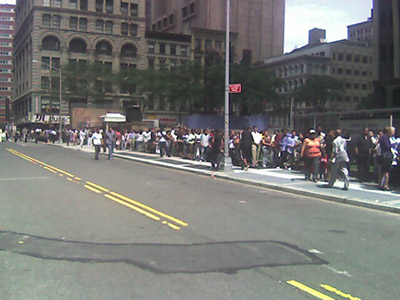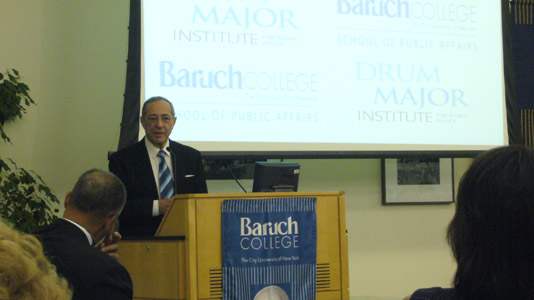|
|
By AL BERRIOS
 |
|
"Next!"
|
But look closer and,
you'd notice that the fellow who appears excited is actually anxious. The
woman on her way somewhere is actually just going to stand across the street.
Everyone, it seems, is not busy, but bystanding. And the simple reason is
that that particular block lies in the heart of a stretch of blocks containing
the highest concentration of convicted criminals in the city, according
to Census and city data (![]() 1).
In other words, people are just standing in place, loitering on every corner,
because they are unemployed or unemployable; naturally, this particular
stretch is also one of the poorest neighborhoods in the city.
1).
In other words, people are just standing in place, loitering on every corner,
because they are unemployed or unemployable; naturally, this particular
stretch is also one of the poorest neighborhoods in the city.
Images and descriptions of living at the bottom are very common, and in many ways, addressed. There are few who could argue the justice of a system that rewards the 700 families living at the top with untold billions and privilege, while 700 and more families in this small piece of East Harlem geography have fathers, brothers, uncles incarcerated; over half don't have a high school education; and those who exist, exist without purpose.
In light of such stark contrasts, contrasts made more apparent by the common benchmark of wealth, we neglect to look at another aspect of societal class: dignity. It is by evaluating something we all possess, dignity, or lack thereof, that we can truly appreciate the stark class differences apart from wealth, since not all of us possess enough wealth to truly understand whether having it or not is what distinguishes a class; but we all possess some level of dignity.
The Middle-Class Got Problems, Too
 |
|
Former
Governor Maria Cuomo speaking at Drum Major Institute's "The
American Dream in the Big Apple" Conference on Monday, April
2nd, 2007 at Baruch College in New York
|
At an April 2nd conference hosted by the Drum Major Institute, a hornet's nest of left-wing liberals, the question of whether or not New York City has become less hospitable to middle-class life was a serious concern. A presentation by academics, politicians, union reps, and a still-engaging former Governor of New York state Mario Cuomo himself, stirred up the hornets so that you couldn't help leaving Baruch College's beautiful Vertical Campus conference floor riled up and foaming-at-the-mouth mad at an "incompetent racist" or two.
(Editor's Note:
My usual luck at conferences seemed to hold up: I inadvertently picked a
fairly good seat next to two neighborly fellows who happened to be senior
leadership for the teacher's union. And we all know how I feel about teacher's
unions [![]() 2].
When I told them that I'm a consultant studying education - because I love
picking fights - their moods swiftly changed. When I revealed some results
of my research, they became visibly irritated. And for a few minutes, it
was indeed awkward. Until more people from their office showed up.
2].
When I told them that I'm a consultant studying education - because I love
picking fights - their moods swiftly changed. When I revealed some results
of my research, they became visibly irritated. And for a few minutes, it
was indeed awkward. Until more people from their office showed up.
(Turns out that their big boss, Randi Weingarten, a woman as despised as Beelzebub himself, was to sit on a panel presentation. My table mates were holding the entire table for their entire office it seemed. And as former-teachers-turned-gangsters trickled in and tightly packed into every available seat at the table, I realized that I was not only in a hornet's nest, but I was sitting among a group of hornets that even the other hornets avoided.
(You ever meet someone who seemed to have been born to just argue at everything for no other reason than to disagree? This clique of education bureaucrats were born to argue. Perpetually in a defensive state, I believe they argue not because they want to win - they assume they're always right and you're an idiot - they argue because after decades of trying to educate your kids, every ounce of patience, civility, and forgiveness they once possessed has been spent. I was glad they were just rude; their leadership has been known to obliterate entire neighborhoods, with people still inside them.
(Oh, and Her Highness, Mistress Weingarten, simply didn't show up; she came down with "screw-u-itous", a form of stomach flu.)
As the day sped through statistics and debates, I started to realize that social "engineers", those highly educated, somewhat mutated and a little deformed liberal academics, don't know anything about society; that politicians in a democratic system are fairly useless - all they do is talk about unsolvable problems to appease the unappeasable; and the problem with politics for consumers is that it's not consumable - it's a process, when consumers only want results.
If the only problems are that the middle-class' income has stagnated and housing is no longer affordable where they want to live, then it's an utterly senseless debate (for why not simply get new jobs, move to more affordable towns or countries, or organize your politicians better). At least the middle-class can find a job; what of those in East Harlem who can't?
And herein lies the fundamental problem in comparing the standards of living solely from the perch of the middle: if you're poor, you've mostly accepted life as it is and attempt to do what you can to survive and maybe "get up out da ghetto"; if you're at the top, you've accepted life as it is and attempt to keep it that way, because you don't want to end up like "those people". Only the middle seemingly refuses to accept poor people being broke, rich people being wealthy, and they always being stuck in the middle (a unique catch-22, which if changed, would no longer make the middle-class the middle-class; it would also mean less conferences and debates about the hardships of living in the middle).
Without Wealth, What's Left?
Why do I pay for a subscription to a magazine, only to have it arrive in my mailbox after it hits the newsstands? Why do my Amazon packages always arrive when I'm not at home, forcing me to go stand in line at the post office during my off day? Why does the bus driver, seeing me waiting for him, keep going?
Why should I have to walk further and pay an extra 28 cents for a gallon of water only because the dollar store nearest me just decided it didn't want to open on time that day? How did I happen to live just 1 block too far for the Chinese food delivery guy to bring me my food?
Why do companies claim they're providing me their best customer service when their 800-number's automated system transfers me around between menus because the system doesn't understand my accent? Why won't Verizon let me just disconnect my phone without reminding me what a gruesome death awaits me because I won't get 9-1-1 emergency response as fast with only my mobile phone as with their landline?
Why does Bank of America charge me overdraft fees when their own "maintenance fee" was responsible for emptying out my bank account? Why does the US Postal Service make the cost of mailing my electric bill as expensive as driving to the local electric utility office myself? And how can Ms. Weingarten run about completely unaccountable to anyone, not our kids, us parents, or her very own teachers, for how she treats them?
Welcome to mine and your world, a world of little (and sometimes, big) indignities, where because we don't ever wonder how we ended up in these situations, we seldom question whether or not the problem is a gap in wealth or a gap in respect.
Sure, it's easier to claim that if you had a little more money, you wouldn't get treated this way because you'd be able to afford to live in a zip code that can enforce its will. But indignities exist no matter how rich and powerful you are.
Think of academics who were "accidentally" placed on the no-travel, terrorist list; lawyers and politicians who lost homes during Hurricane Katrina and insurance that won't pay for their damages because they weren't covered for "wind" damage; and CEO's who can't keep their earnings if it's considered "too much" by a bunch of billionaires.
And on the other spectrum, think of poor nicotine addicts in East Harlem who can't buy cheaper cigarettes purchased online because the government wants to tax even them; mothers who have to carry carriages with their babies inside because the subways in their neighborhoods don't have elevators; and vets returning from wars without the ability to feed their families because they can't find serious jobs, but if they did, are too traumatized to function and don't receive the medical attention they need due to bureaucracy.
Regardless of who you feel sorry for, the bottom line is that we all suffer indignities. And if we all suffer indignities, then we're all in the same class, because no indignity is greater than another when you're the one going through it. And if we're all part of the same class, then why are we wasting time clashing with each other instead of figuring out that the only way to eliminate those indignities is by respecting each other and not coveting each other's wealth and status?
|
Trade
Event Grade: + + + +
|
Footnotes
(1) Moore, Robert, "Convict Alley in Harlem Nabe", March 18, 2007, New York Daily News
(2) Unions: "There's
nothing you can do about it.", http://www.alberrios.com/c/111103management.html
Al Berrios is Managing Director of al berrios & co., a pure strategy consulting firm, specializing in advising organizations + entrepreneurs on managing their enterprises in a service economy. Write or Subscribe to Consumer Strategies Report.
|
|